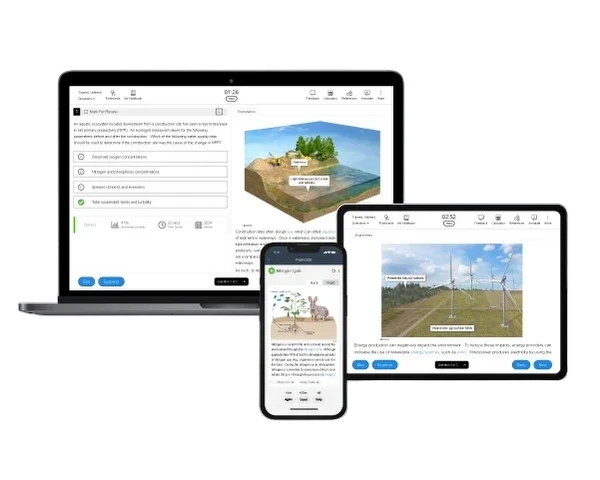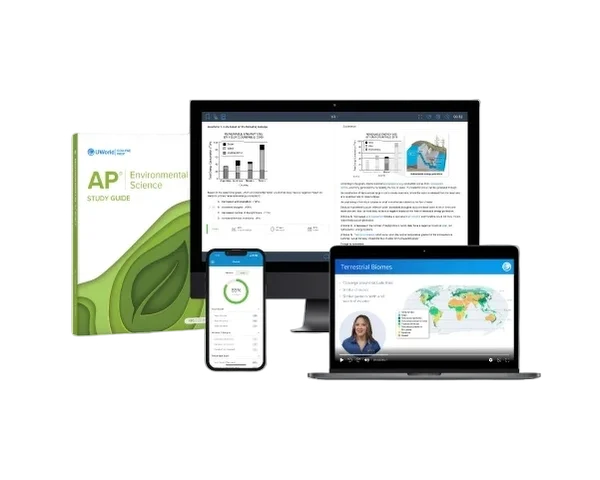Environmental science is an interdisciplinary subject that focuses on ecological processes, human environmental impacts, and potential solutions to mitigate or avoid natural and man-made environmental problems.
The AP® Environmental Science (APES) course is equivalent to a 1-semester introductory college course in environmental science. While most schools offer APES as a year-long course, some may offer it as a semester-long option.
The AP Environmental Science exam assesses you based on 2 categories: course units and concepts, and science practices, as established by College Board®. The course content is organized into units and topics, with 4 overarching Big Ideas. Those include:
- Energy Transfer (ENG)
- Interactions Between Earth Systems (ERT)
- Interactions Between Different Species And The Environment (EIN)
- Sustainability (STB)
These big ideas serve as the foundation of the course and will help you create meaningful connections between the units. Revisiting the big ideas and applying them in various contexts will help you develop a deeper conceptual understanding of the subject.
The 4 Big Ideas are threaded through 9 course units:
- Unit 1: The Living World: Ecosystems
- Unit 2: The Living World: Biodiversity
- Unit 3: Populations
- Unit 4: Earth Systems and Resources
- Unit 5: Land and Water Use
- Unit 6: Energy Resources and Consumption
- Unit 7: Atmospheric Pollution
- Unit 8: Aquatic and Terrestrial Pollution
- Unit 9: Global Change
As you progress through the APES course units, you'll develop skills categorized under 7 science practices. These science practices are central to the study and practice of AP Environmental Science, and you should apply them regularly during your test prep. Remember that all exam questions will require you to apply 1 or more of these practices to derive solutions. Here's a look at the science practices:
- Concept Explanation
- Visual Representations
- Text Analysis
- Scientific Experiments
- Data Analysis
- Mathematical Routines
- Environmental Solutions
Check out our guide to the AP Environmental Science course and exam description here.
AP Environmental Science Exam Format
The AP Environmental Science exam takes 2 hours and 40 minutes to complete, and it has 2 sections:
- Section 1: Multiple-choice section (MCQ)
- Section 2: Free-response section (FRQ)
| Question Type | No. of Questions | Time | Score Weight |
|---|---|---|---|
| Multiple-choice questions (MCQ) | 80 | 1 hour 30 mins | 60% of the total score |
| Free-response questions (FRQ) | 3 | 1 hour 10 mins | 40% of the total score |
Multiple-Choice Questions
Section 1 has 80 MCQs to be answered in 1 hour and 30 minutes. It is recommended to aim for 1 MCQ per minute, which will give you an extra 10-minute window to review your answers or tackle any difficult questions you might have skipped. Since there is no penalty for incorrect answers in this section, be sure to answer every question, even if you need to guess.
The MCQ section includes individual and set-based questions. Individual questions are standalone prompts with 5 answer choices, and you must choose the correct option. Set-based questions come in groups of multiple questions that are related to a common data point or illustration. There will likely be 8 to 10 sets of questions, each designed to test specific concepts, topics, and skills you've learned in the APES course. Here's a breakdown of the set-based questions:
- 3-4 sets will be based on quantitative data such as data tables, graphs, or charts
- 3-4 sets will be based on qualitative data or information such as representations, models, or maps
- 2 sets will be based on text-based sources
Free-Response Questions
Section 2 includes 3 free-response questions. You have 1 hour and 10 minutes to answer them. These questions require paragraph-length responses.
Learn more about the exam format and the topics on our AP Environmental Science exam format page.
Why Take AP Environmental Science?
AP Environmental Science isn't just another science class — it's a subject that offers a range of benefits beyond being an AP course. Here's why you should consider taking it:
- Versatile Course for Multiple Majors:
APES is perfect if you're interested in the sciences and social sciences. It's useful for majors such as anthropology, geography, urban and area studies, as well as science fields such as marine biology, geology, ecology, and environmental engineering.
- Boost Your High School Transcript and College Applications:
AP Environmental Science scores carry more weight than regular GPA grades, so even a modest grade in an AP class is often seen as more impressive than acing a regular exam. A strong AP score can help you stand out to college admissions officers.
- Earn College Credits:
AP Environmental Science scores of 3 or higher can earn you college credits at many universities.
- Earn Advanced Placement in College Courses:
A good APES score may allow you to skip introductory courses and start in more advanced or intermediate college-level Environmental Science courses, giving you a head start in your academic career.
- Save Time and Money:
By earning credits and advanced placement through your APES score, you can reduce your time spent in college and save money on tuition.
Maximize your exam score with our all-in-one AP Environmental Science online course featuring engaging videos, expert-designed practice questions, and an illustrated study guide with step-by-step answer explanations to help you succeed.
Should I Take AP Environmental Science?
AP classes can be incredibly rewarding when they align with your goals. Deciding whether AP Environmental Science is the right course for you depends on your interests, skills, and academic plans. Here are some key factors to consider:
- Are your career goals, volunteer work, or interests tied to sustainability, climate change, or environmental policy?
If you're passionate about understanding and solving real-world environmental challenges, APES could be an excellent choice. The course explores critical topics like climate change, sustainability, and resource management, providing a solid foundation for careers in science, policy, or engineering. However, if your interests lie more in advanced topics within biology, chemistry, or physics, you may want to explore those AP courses instead.
- Are you flexible with your college major?
APES is a great option if you're undecided between science and social sciences. The course bridges the gap between these fields, offering flexibility and valuable college credits or placement opportunities in both areas.
- Does APES suit your skill set and study habits?
Success in APES requires a mix of skills, including memorization, problem-solving, and data analysis across subjects such as biology, geography, math, and chemistry. If these areas are your strengths, APES could be a great fit.
- Do you have time to manage the APES coursework alongside your other AP classes?
While APES might have a reputation as an easier AP science course, many students find it more challenging than expected. Consider how it fits into your overall AP schedule. It's better to excel in fewer courses than to take on too much and struggle.
If you answered “yes” to these questions, APES could perfectly fit you. It's more than just a science class — it's a course that connects learning to the world around you and helps you make a real impact.

Is AP Environmental Science Hard?
AP Environmental Science covers a lot of ground. If you're aiming for a top score on the AP Environmental Science exam, it helps to know the stats. In 2024, 54.1% scored 3 or above on the AP Environmental Science exam, with just over 9% earning a 5.
While this might help give you some context, the 2024 APES exam scores don't fully capture how challenging the course might feel for you. The difficulty depends on your interests, skills, and academic strengths. You'll likely find the effort rewarding if you're passionate about science and the environment.
AP Environmental Science Review Tips
Although the AP Environmental Science exam can be challenging, we've put together a few review tips to help you get a head start on APES success!
-
Create a Dedicated Study Schedule and Stick to It:
The best way to track the topics you've covered and identify the areas you still need to work on is by following a well-planned APES study plan.
- Learn the APES Exam Format:
Understanding the exam format will help you know exactly what to expect. This allows you to manage your time effectively and avoid missing out on easy questions. Plus, you'll have extra time to review your answers.
- Invest in Quality Review Materials:
UWorld's AP Environmental Science practice tests come with helpful learning tools such as flashcards to reinforce what you've learned. Our practice tests let you choose the number of questions you want to test yourself on and track your progress with detailed answer explanations and illustrations for easy learning.
What to Bring to APES Exam?
Since the AP Environmental Science Exam is now digital, students must ensure they have the following items on exam day:
Required Items
- A school-issued or government-issued photo ID (required if testing at a school other than your own)
- A fully charged device and its power cord
- College Board account login details
- Pens or pencils for writing on scratch paper provided by the school
- A watch (without internet or smart capabilities)
- Up to 2 approved calculators
Optional Items:
- An external mouse
- An external keyboard (required if testing on a tablet or iPad). You cannot use a laptop
Frequently Asked Questions (FAQs)
Is AP Environmental Science an elective?
Yes. AP Environmental Science is typically taken as an elective course.
Is AP Environmental Science a physical, biological, or social science?
AP Environmental Science is an interdisciplinary science that incorporates elements of all three: physical, biological, and social sciences. It draws from geology, chemistry, biology, ecology, and environmental studies, as well as aspects of economics and policy related to environmental issues.
What is the purpose of AP Environmental Science?
AP Environmental Science aims to help you understand how the natural world functions by studying its scientific principles, concepts, and methods. You’ll also learn to identify and analyze environmental issues, assess their risks, and explore solutions to address or prevent them.
When is the AP Environmental Science 2025 exam?
The AP Environmental Science exam for 2025 is at noon local time on Tuesday, May 13.
When do students usually take AP Environmental Science?
Students typically take AP Environmental Science during their junior or senior year. The specific grade level and prerequisites may vary by school, so it’s advisable to consult your school’s guidance counselor or the AP coordinator for guidance on when to take the course.
The College Board recommends that students complete 2 years of AP laboratory sciences, such as biology and chemistry, and 1 year of algebra before taking AP Environmental Science.
Where can I find past AP Environmental Science exam questions?
AP Environmental Science past exam questions are on the College Board website.
What happens if you fail the AP Environmental Science exam?
Scoring below a 3 on the AP Environmental Science exam does not negatively affect your high school record or GPA. Additionally, it typically does not affect your chances of college admission, as admissions decisions are based on a holistic review of your academic performance, standardized test scores, extracurricular activities, and other factors.
How much does the AP Environmental Science exam cost?
The AP Environmental Science exam costs $99 for students residing in the U.S., Canada, and U.S. territories and $129 for everyone else. You can learn more about this on our AP Exam Eligibility & Registration page.
Is AP Environmental Science good for pre-med?
AP Environmental Science can be a valuable course for pre-medical students, but it may not be a central requirement for admission to medical school. APES can be a good choice for pre-med students who have a genuine interest in environmental science and its potential connections to health, which can help them shine in the fields of public health and medicine.

Read More About the APES Exam
Want to know how the APES exam is set up? Here's a simple guide that breaks down the parts of the exam, question types, sections, and more format info you need!
AP Environmental Science Course DescriptionIt takes a long time to go through the entire CED PDF. See the AP Environmental Science CED for a comprehensive overview of the exam, units, topics & key skills.
AP Environmental Science Study PlanGetting into a prestigious college often requires a perfect 5 in AP. Here's our APES study plan, written by experts and packed with useful info to help you ace the test.
AP Environmental Science Scoring GuideTrying to figure out how the AP Environmental Science exam is graded? This guide has everything you need to know about how the MCQ and FRQ scores are calculated.
Best AP Environmental Science Course ReviewAre you looking for the best AP Environmental Science prep course? Explore top-rated options with expert insights on content quality, practice resources, and study tools.
Best AP Environmental Science Study Guide ComparisonDiscover the most recommended APES study guides, including expert insights on which ones provide the best explanations, practice problems, and test-taking strategies.
References
- AP Environmental Science. (n.d.). apcentral.collegeboard.org. Retrieved December 16, 2024, from https://apcentral.collegeboard.org/courses/ap-environmental-science/exam
- 2021 AP Course Overview - AP Environmental Science. (n.d.). apcentral.collegeboard.org. Retrieved December 16, 2024, from https://apcentral.collegeboard.org/media/pdf/ap-environmental-science-course-overview.pdf
- AP Environmental Science Course and Exam Description. (Fall 2020). apcentral.collegeboard.org. Retrieved December 16, 2024, from https://apcentral.collegeboard.org/media/pdf/ap-environmental-science-course-and-exam-description.pdf
- 2025 AP Exam Dates. (n.d.). apcentral.collegeboard.org. Retrieved December 16, 2024, from https://apcentral.collegeboard.org/exam-administration-ordering-scores/exam-dates
- AP Exam Fees. (n.d.). apcentral.collegeboard.org. Retrieved December 16, 2024, from https://apcentral.collegeboard.org/exam-administration-ordering-scores/ordering-fees/exam-fees
- Past AP Environmental Studies Score Distributions. apcentral.collegeboard.org. Retrieved December 16, 2024, from https://apstudents.collegeboard.org/about-ap-scores/score-distributions/ap-environmental-studies
- What to Bring on AP Exam Day. (n.d.). apstudents.collegeboard.org. Retrieved December 16, 2024, from https://apcentral.collegeboard.org/exam-administration-ordering-scores/administering-exams/preparing-for-exam-day/what-students-can-cannot-bring




